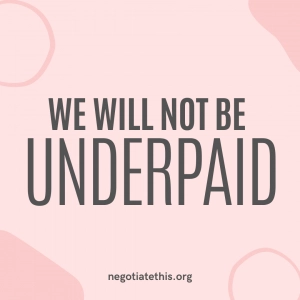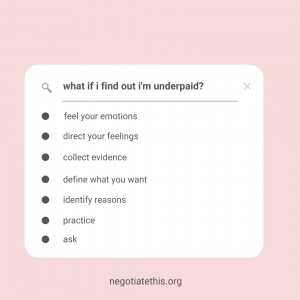What do you do if you find out you’re underpaid? You might be angry. Maybe you are confused. You might be wondering why your skills aren’t being valued. Many find themselves in this position and don’t know what to do. Here are 7 steps to take when you find out this unsettling (or infuriating) information.
This is an honest account of what I, the creator of Negotiate This, did when I figured out I was underpaid. I chose the words “figured out” instead of “found out” because I actually had to figure it out on my own. There was no person or system that was going to let me know or let me find out about this inequity transparently. I had to investigate, listen, and figure it out on my own, with the help of some colleagues. This post is an account of what I did when I figured out I was underpaid and the 7 steps I took to remedy it.
7 Steps To Take When You Find Out You’re Underpaid
- 1: Feel Your Emotions
- 2: Direct Your Feelings
- 3: Collect Evidence
- 4: Define What You Want
- 5: Identify Reasons
- 6: Practice
- 7: Ask
- And If That Doesn’t Work?

Step 1: Feel Your Emotions
If I didn’t tell you I was angry as hell when I found out I was underpaid, I would be lying. I was so angry. Fuming. I had already negotiated. My current salary was my negotiated salary. I could have breathed fire. Feeling your emotions is a vital first step of the 7 steps to take when you find out you are underpaid.
I replayed the first negotiation I had with my employers. They acted like they had to make huge concessions to give me my increase. They acted like they had to make burdensome exceptions to give me even that small increase.
Little did I know, that was the game. This is the game. After I found out what the game was, I could better understand the rules. I could play the game. And win. I sat with my anger and it propelled me into action.

Use Your Emotions
Use your emotions. When people say that there is no room for emotion in negotiation, they’re wrong. There is. There’s room for it in the foundation, in the preparations and even in the act. The trick is to leverage your emotions and use it to your advantage.
My emotion was anger and that aided in my next actions and future negotiation. It led me to act with a conviction of my worth and during my ask, I didn’t flinch. I leveraged my emotions to support my negotiation.
Step 2: Direct Your Feelings
After I felt my fury and lived in my anger for a bit, I started to take action. My anger propelled me to start doing my own investigation. I heard that I was underpaid by overhearing that a coworker made more than me. Was this secondhand information legitimate? I needed to check.
First, I did a side by side analysis of the experience, education and expertise of the coworker who purportedly made more than me. This analysis further fueled my fury. There was no large differentiator between my coworker’s experience and mine.
Furthermore, I had more education than this coworker and I had a more specialized skill set, which was in high demand. Few people had this skill set. This made me further question why this coworker was paid more than me.

Asking & Sharing
*If you have been reading the blog posts on the site or following my Instagram, then you know that people are not paid equally out of the blue or “just because”. The reason this coworker likely made more than me was because they asked.
They asked, demonstrated evidence, and received. It likely did not have to do with the level of experience, education, or other factors. It is rarely based on those factors alone, which makes asking and sharing salary information so important.
This coworker could also be deemed as an expert at their craft, which could explain their higher earnings. But then again, so was I. So why wouldn’t I be in that salary bracket? One theory is that I didn’t ask for enough. I asked for more, but it wasn’t as much as this coworker likely asked for.
It’s not about the coworker. It’s about knowing about the information and income ranges and taking action to get paid appropriately. Direct your emotion into gathering information and fact finding surrounding pay practices.

Step 3: Collect Evidence
Are you underpaid? How do you know? What evidence do you have? Start collecting that evidence. This is where my emotions really fueled the process. My anger allowed my fear of talking about money to dissipate and it was replaced by pure motivation. I was no longer afraid to ask coworkers what they made. A fiery determination to get what I deserved replaced any previous hesitation.
I will admit, before I found out I was underpaid I was timid and nervous to ask others what they made. Before, I focused on asking others by using the phrase, “I’m going to ask for X amount, do you think that is an appropriate number to ask for?” and then assess if it was too low, too high, or just right by my coworker’s reaction.

Determined to Not Be Underpaid
This time, it was different. I was determined to not be underpaid. I just came right out and asked. “So, how much do you make?… if you don’t mind me asking.” What made this ask a tiny bit easier was that it was around the annual review time, so many people (who knew they needed to negotiate) were negotiating. With that circumstance, the topic was not completely out of context.
*Although, I now feel comfortable to ask at any time because I know the importance of this act. That was just my motivation at that time. I encourage asking well before annual review time (and bringing it up to your manager well before review time too).
Asking coworkers how much they made did catch them off guard. Even though coworkers were sharing stories of feeling underpaid, directly asking them the exact amount they were paid was a little unnerving for them. That’s okay. If we aren’t uncomfortable, we’re not making strides. I felt a little uncomfortable and so did they. That is okay and how we break these false narratives and taboos that talking about money in the workplace is not okay. It is. It is so necessary. Push yourself to feel uncomfortable. Also be ready to share your numbers.
Online Salary Tools
To collect more evidence, check out online salary estimation tools and salary websites. Put in your search bar: “top salary websites” and use those to help inform your search.
*Remember that this information may not be regional (some allow for that distinction) and may not assess experience, education, size of company, and other factors that cannot be accounted for in online tools and platforms.
*Also be aware that online salary tools that are self-reported may be less accurate or skew low. This is also why asking coworkers is fundamental to the process of accumulating accurate evidence.
Step 4: Define What You Want
Do you know what you want? If you don’t know what you want, there is no way anyone else can help you. Make sure you have defined what you want. Make it an exact dollar amount if you are asking for more money.

Check out the post 3 Numbers You Need to Have Ready When Negotiating to help find the numbers you need to organize your ask. Walk into a negotiation feeling confident because you have your 3 numbers ready. These 3 numbers are the boundaries you stick to and guide your negotiation.
These three numbers are:
- 1. Asking price
- 2. Desired price
- 3. Walk away price
Thorough research will help to inform these negotiation numbers. Asking your colleagues how much they make is greatly informative.
What do you want? Is it money? Is it fewer hours in the day? More vacation? Remote work? Do you have an Option B and Option C if the first ask doesn’t work out? Do you have nonnegotiables? These all help in defining what you want and sets boundaries for your negotiation.

Step 5: Identify Reasons
Now that you know what you want, why should you get it? Just because you work somewhere doesn’t mean that alone constitutes a raise or increase. The value you provide will inform the rationale for your ask.
Remember: You are answering the question from your employer, “What’s in it for me?” If there’s nothing in it for your employer, why would they give you more? You must identify what is in it for them.
Check out the post 3 Easy Steps to Promote Yourself in a Negotiation to highlight the unique value you add. The post 3 Tips: Find the Numbers to Emphasize Your Contributions will help explain how to quantify the value you add.
Take what you do every day into consideration. Look at who you work with and the service you provide. Ask yourself: What unique skills do I have? What value do I add? What do I do better than anyone else in the organization? Which skills do I possess that exceed industry norms? What is my expertise? What do others come to me for because I do it best?

Accomplishments & Potential
Talk about your accomplishments but also talk about your potential. Potential can be more persuasive than experience, says Daniel Pink, persuasion expert (Pink, 2020). Potential creates uncertainty and this means you can fill this uncertainty with positives.
After you have identified the value you add and have an outline of examples of why you deserve your asking price, ensure that you are only naming a few reasons for why you deserve the raise. Creating an exhaustive list may appear as a desperate attempt, whereas a few succinct points appear more credible (Pink, 2020). Fewer options are more persuasive (Pink, 2020).
After you have outlined why you deserve more, have you answered the question from your employer’s perspective, “What’s in it for me?”
Step 6: Practice
Practice is pivotal. Don’t skip this step. It has its place within the 7 steps to take. Practice how you will begin. Think of potential counterarguments. Practice keeping calm. You have leveraged your emotions into the stages working up to the negotiation. In the negotiation, keep your calm to show you are confident about your skills and your ask.
Practice in the mirror, to your cat, to a friend. Practice out loud. Each time you practice, it will make the actual ask less stressful.
Practice Counteroffers
Make sure to practice counteroffers. Why might they say no? How will you respond do that? Would it help if you address it first so you can control the conversation?

Step 7: Ask
This step is obvious, right? You did not do all this work for nothing. This is what the previous steps have led to. This is the most important of the 7 steps. You have to ask for more to receive more.
The moment is here. You have researched and asked colleagues how much they make. Your value is defined. You have examples for how you add value and how you will add value in the future. What you want is specifically defined. Potential counterarguments and counteroffers have been practiced. You are calm and collected because you directed your emotions into the process of asking for more. You are sure of your worth.
Check out this post to focus on the things you can control:
And If That Doesn’t Work?
Just as you’ve read in this article, there are specific methods that are considered Negotiation Best Practices.
Negotiation Best Practice:
Instead of: “John gets paid $X. I should get paid $X, too.”
Try: I’ve added value by increasing revenue by $A, brought in a new client base that increased sales to $B and I created a new system to track lost customers, which led to a 22% increase in retention.
As a top performer, focus on how you bring value with tangible examples. Then ask for what you want.
But…
*But… there is no disputing that the above example is a completely valid argument. If there is a pay disparity, you should be privy as to why. (If it were fair… why would it need to be a secret?)
Whether this works in real-life scenarios is another story. *But keep in mind that there ARE times and places where this is completely appropriate. Take your unique situation into consideration and make the best decision for your situation. While it can be a scary and potentially risky, speaking up about these types of situations is how we create change.
It could even be as simple as inquiring about the pay structure of the organization and what pay is based off.
Check out this post for more tips:
You’ve got this. These 7 steps can help you with your next negotiation. Negotiate for your worth.
7 Steps to Take: The Quick List

To read more about what steps you need to take when negotiating, check out the blog post: When You Negotiate Make Sure You Complete These 8 Items
If you want weekly motivation and negotiation tips, sign up for blog posts and for daily inspiration follow @negotiatethis on Instagram. You got this.
Sources:
Pink, Daniel (2020). Daniel Pink Teaches Sales and Persuasion. MasterClass.
Disclaimer: While the contents of this post and blog come from research and personal experience, each experience, situation and/or person has their own unique circumstances. This is not negotiation, financial or any other form of legitimate or official advice from an expert. Each individual should do their own independent, comprehensive research. Negotiation, career and all other decisions are the sole responsibility of each individual or party. Details found on the blog and in individual posts are opinions and should be treated as such for entertainment purposes only. Read further disclaimer information in the footer and on the Disclaimer page.
